Search the Special Collections and Archives Portal
Search Results
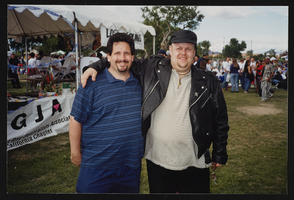
Spencer Goodwin and Steve Miller at Gay Pride: photographic print
Date
Archival Collection
Description
Image
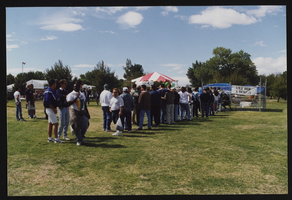
People lining up for beer at Gay Pride: photographic print
Date
Archival Collection
Description
Gay Pride at Sunset Park, 1998. Photographer: Dennis McBride. People lining up for beer tickets at Sunset Park. (4-25-98)
Image
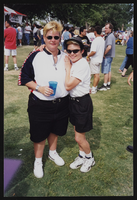
Strutt Hurley and Anne Mulford at Gay Pride: photographic print
Date
Archival Collection
Description
Image
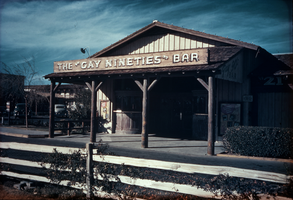
Slide of the Gay Nineties Bar at the Hotel Last Frontier, Las Vegas, 1940-1950s
Date
Archival Collection
Description
Image
Joan Swift oral history interviews
Identifier
Abstract
Oral history interviews with Joan Swift conducted by Sue Peterson on March 18, 2004, March 25, 2004, and June 22, 2004 for the Boyer Early Las Vegas Oral History Project. In this interview, Swift discusses life in Las Vegas, Nevada during the 1940s and 1950s. Swift begins the interview by describing her upbringing in the Basic townsite and Boulder City, Nevada, attending Basic High School, and life in Southern Nevada during World War II. She then discusses working in the Clark County Recorder's office, explaining her job duties and what function the office served for the county. Swift continues, talking about recreation activities at the time, including visiting the casinos on the Las Vegas Strip and the Helldorado Parades. Swift discusses nuclear weapons testing at the Nevada Test Site and her career as the Clark County recorder. Lastly, she describes her thoughts on the future of Las Vegas, Nevada.
Archival Collection
A. D. Hopkins oral history interview
Identifier
Abstract
Oral history interview with A.D. Hopkins conducted by an unidentified collector on February 26, 1979 for the Ralph Roske Oral History Project on Early Las Vegas. Hopkins discusses the historical background of Pioche, Nevada.
Archival Collection
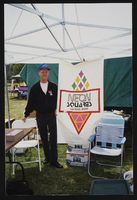
Unidentified man at Neon Squares booth at Gay Pride: photographic print
Date
Archival Collection
Description
Image
Norma and Gil Schwartz oral history interview
Identifier
Abstract
Oral history interview with Norma and Gil Schwartz conducted by Stefani Evans and Claytee White on September 22, 2017, October 04, 2017, and February 14, 2018 for the Building Las Vegas Oral History Project. In the three interviews, the couple describes Gil’s leadership in the National Association of Real Estate Brokers (NAREB), properties that he’s built and developed, and purchasing blueprints of un(der)developed parcels in Las Vegas, Nevada on behalf of Howard Hughes's land agent, J. Herbert Nall.
Archival Collection
Stella Champo Iaconis oral history interviews
Identifier
Abstract
Oral history interview with Stella Champo Iaconis conducted by Kay Long on May 14, 1997, May 21, 1997, May 26, 1997, and September 22, 1997 for the Women's Research Institute of Nevada (WRIN) Las Vegas Women Oral History Project. Iaconis opens her interviews discussing her difficult upbringing and life on a ranch in Las Vegas, Nevada with her dad in the 1910s and 1920s. Iaconis then describes her experiences as a waitress in Las Vegas. As the interviews continue, Iaconis discusses Block 16 and sex work, the Helldorado Days, and life in 1930s Las Vegas. Iaconis ends the interview talking about her father and his career as a miner; her many husbands; and her personal history in Las Vegas.
Archival Collection
